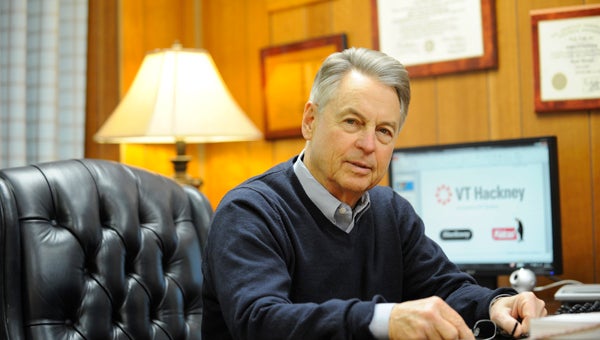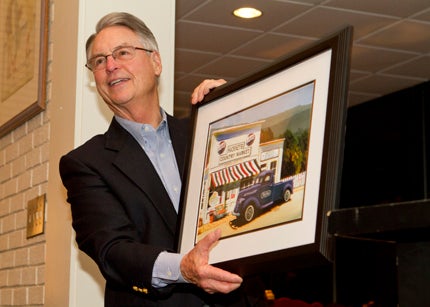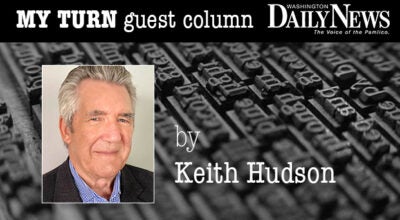MOVING ON: VT Hackney says farewell to one of its own
Published 6:32 pm Saturday, January 31, 2015

VAIL STEWART RUMLEY | DAILY NEWS
CORNER OFFICE: Hodges Hackney retired this week after five decades of service to VT Hackney. The Washington company was started by Hackney’s grandfather and great uncle in 1910.
Hodges Hackney said farewell to the transportation business Wednesday.
For 50 1/2 years, Hackney has been a part of the company started by his grandfather and father; an offshoot of another company started in 1910 by Hackney’s grandfather and great-uncle, which was yet another offshoot of a Hackney company started in Wilson in 1854. Look back over the centuries and the Hackney company tree is filled with such offshoots — one family providing transportation of all types for 395 years.
“It is remarkable that the Hackneys, for this long, have continued to utilize those unique skills in building transportation equipment,” Hackney said. “I guess that we all — it’s a natural, inherited interest in this line of work, in the transportation business.
“It’s great to be a part of that history,” he said.
Hackney retired this week after shepherding VT Hackney through the largest growth in its history, through national expansion, through the sale of the company to an investment group, through international expansion, signing contracts with partners in 40 countries. When Hackney first started work at Hackney and Sons in 1964, fresh from a N.C. State University engineering degree and a MBA from University of North Carolina-Chapel Hill, he took over sales for the company. At the time, there was stiff competition in the business of making beverage truck bodies, which the company began to specialize in in the mid-1940s.
“When we went into the business, there were a lot of competitors, most of them located much more strategically than eastern North Carolina,” Hackney said. “We tried to become innovators in the industry, and we did.”

WILL PRESLAR
IN THE PAST: Friends, family and colleagues gathered to give Hodges Hackney a big sendoff Wednesday night at the Washington Yacht & Country Club. Here, Hackney displays a print gifted to him at the dinner.
It led the Hackneys — father James, brother Jim and Hodges Hackney — and their team of engineers to take some risks, many of which were successful. In 1968, they gave up steel in favor of aluminum, developing a much-lighter truck body that allowed trucks to carry more cargo and warded off the corrosive effects of salt used to de-ice roads in northern climes. In 1973, they built a plant in Independence, Kan. — a town chosen for its similarities in size and makeup to Washington — and expanded nationally. Next, they teamed up with Ford to make the process of putting body to truck a speedy one.
“We were able to convert the industry over by offering them quickly,” Hackney said. “Once we went that direction, (the competition) never came back.”
By the mid-1970s, Hackney and Sons had risen to No. 1 in the industry and controlled over 50 percent of the market.
In the 1980s, Hackney and Sons branched out in another direction — that of truck bodies for emergency vehicles.
“We built the first one in 1985-86 and gradually refined it,” Hackney said. “Now it’s a major part of our business.”
All emergency vehicles produced by Hackney are made in Washington — a location that helped the company step into high gear after 9/11, when New York City fire and rescue desperately needed a new Hackney command center vehicle. The first was crushed when the towers fell. At the Washington plant, employees worked around the clock to build a new one. Such a project normally takes six to eight months — they accomplished it in two weeks, Hackney said.
By the time the family sold the business in 1990, the company had over 200 workers and was doing $50 million in sales annually. Hackney said he stayed on to help develop an international business. Though he never set out to devote half a century to the work, he remained enthusiastic about the expansion that would take him all over the world: to eastern Europe when the Soviet Union fell, where the company partnered with Volvo to put American-made Hackney bodies, assembled from kits, onto their trucks; to Mexico and into Latin America; to Asia and Africa. Since 1993, over 25,000 Hackney truck bodies have been assembled outside of the U.S.
The company was sold again in 2005, this time to a multinational corporation, Singapore Technologies Engineering. VT Hackney went from sales of $1 million in 1964 to $100 million today.
But Hodges Hackney takes little credit for the growth of the business over the past 50 years, instead assigning it to others.
“I’ve been surrounded by wonderful people,” Hackney said. “The only reason I’ve been successful is for the great job they’ve done. I credit all my success to the people who work here.”
The person who tops that list is Hackney’s wife, Marsha. In the early days of his career, the industry was small, and endless conventions and social events were the way to build client relationships. Hackney said, in addition to her presence on the convention floor and for the required socializing, Marsha also would sit in on lunch interviews with potential employees. He found he was better off with her input, he said.
“She had a great intuitiveness — she was remarkable at it. I made the worst mistakes when I didn’t listen to her,” he laughed. “It’s been a team effort.”
Later, the company’s international expansion would take Hackney overseas time and time again, but always with continued support from home, he said.
“I don’t know how much time I was away from Marsha, but it was a lot,” Hackney said. “Without her, I wouldn’t have been successful at it.”
Two years ago, Hackney began making the transition away from the international work so he could be closer to home, and Wednesday, the company held a celebratory farewell dinner at the Washington Yacht & Country Club.
His retirement could be considered the end of the line for the Hackney name: Hodges Hackney is the last of four centuries-worth of Hackneys in the transportation business. But in a way, the name will live on in perpetuity, in the Hackney nameplate found across the world.





